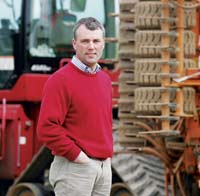Cost monitoring pays dividends for Farmers Weekly Awards winner

Nailing down cost of production to the last penny per tonne is now part of the routine for Andrew Ward, winner of last year’s FW Arable Farmer of the Year Award.
Monitoring and allocation of direct crop costs was firmly established last year at Roy Ward Farms, Glebe Farm, Leadenham, Lincolnshire, with fuel use and hours worked being recorded every time a machine enters and leaves a field.
Reducing establishment costs has been a focus for several years, with min-till based around a Simba Solo usually achieving establishment with two or three passes. Fertiliser cost is kept downby using sewage sludge where possible to minimise P and K costs.
But in preparing for the awards, Mr Ward was keen to drill down to that last penny to be properly prepared for judging. This meant including costs which almost all farms carry, but which are often not allocated to production costs per tonne.
“The Farmers Weekly Awards really got me to look at these costs. I spent two to three hours with the accountant sorting out how to approach it and then it took me a couple of weeks on and off in my own time to get it all sorted. Once you’ve done them, it’s the same for every crop and really shows how getting high yields is so important.”
The costs include rent and finance, property costs, electricity, telephone, subscriptions, accounting and other professional costs, secretarial costs, machinery hire and other sundry expenses. For the 2008 crop these added up to £161/ha, or £13.64/t on 11.8t/ha first wheats.
As a result of this exercise, Mr Ward will be tackling some overhead costs which are necessary, but which often receive relatively little attention. He will undertake a thorough insurance review this year, having tended in the past to renew with the same provider year on year. He has professional fees in his sights, too.
He has already made the decision to move away from his main bank to fix his SFP at the current favourable exchange rates, as his main lender did not offer the facility he preferred for this. “I maybe wouldn’t have done that if I hadn’t gone through the costings in such detail.”
This attention to detail not only helped him win the award, but has enduring benefits for the business. Knowing total costs of production helps with management decisions about cropping and crop sales. In January Mr Ward sold part of the 2010 crop for November at £130/t. With a rent review also underway, it helps him to present his case in negotiations.
“Our establishment costs for the 2009 crop will be the highest since we abandoned the plough in 2003 and moved to the Simba Solo. An extra pass or two was needed with the Simba CultiPress before drilling, coupled with high fuel being the main reasons.
“Even though farm-saved seed is always used, seed costs are also the highest for many years. Because thousand grain weights were so high, we used an extra 12.5t of seed last autumn. Also, Secur seed dressing was used to combat the massive slug threat.”
Fuel costs
- Diary in every tractor, fuel level and hours recorded on entering and leaving each field
- This allows more accurate allocation of costs to individual crops – a Solo and press on heavy soil uses 62.5 litres of fuel/hour, the same kit on the farm’s heath land uses 54 litres/hour
- 27,000-litre tank allows bulk buying of fuel when price is favourable
- Worksheets for crop production costs updated with new fuel price at every fuel delivery
Benefits from award
- More detailed costs of production now calculated as routine, helps with management decisions
- Increasing involvement with machinery, fertiliser and advisory companies keen to be associated with a forward-looking winning farmer
- This gives access to top technical advice, trials on farm, trips abroad, better deal on machinery and equipment
- Moved to GAI oilseed rape canopy management system this season, expected to deliver fertiliser savings of £2600 across the crop
Farm details
- 656 ha (1621 acres), part of which rented from Leadenham Estate on traditional tenancy, part owned, part contract-farmed
- Three different rotations because of wide range in soil types from clay to heath
- Cropping includes wheat, spring barley (malting), rape, HOLL rape, spring beans and sugar beet
- Worked by Andrew Ward, one full-time, one part-time employee
| Still time to enter There’s still time to enter this year’s Farmers Weekly Awards,but you’ll have to hurry.To beat the 30 April deadline log on now to www.farmersweeklyawards.co.uk and follow the instructions.
|
|---|

